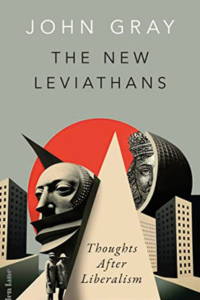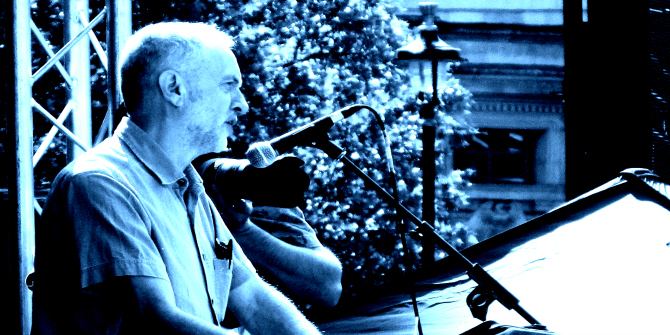As this year’s party conferences get underway, LSE’s seasoned conference envoy Tony Travers recommends ten books for readers seeking in-depth analysis of the UK’s political landscape.
The dawning of the party conference season is a good opportunity to pause and read about the health (or otherwise) of British government, constitutional institutions, politics and politicians. After one of the most remarkable periods in post-War history, including a global financial meltdown, Brexit, Covid-19, the death of Queen Elizabeth II, the “year of three prime ministers” and the return of war to Europe, there is clearly a serious risk of longer-term instability. Actual wars and culture wars provide weaponry for each other, while at the same time British politicians find time to squabble about traffic humps. The so-called “post-truth era” looks ominously like a threat to Enlightenment rationalism and liberal democracy. AI is about to destroy the world and/or save it.
What better time to choose some books to provide a backdrop for debate and ideas for the future. To look backwards (never ignore history, even if it is not predictive) while seeking fair and inventive policy for the future. Here are a few books about British political life, government and institutions to accompany the party conferences.
Politics and government
Deborah is now Director of Strategy at the Office of Sir Keir Starmer, Leader of the Opposition, having run a company (BritainThinks) which explored public opinion and attitudes to politics. The loss of the so-called Red Wall in 2019, largely as a result of Leave voters switching from Labour to the Conservatives, remains an obsession for British politicians, albeit one most of them rarely mention. The book is clearly a guide to the Opposition as it seeks to shape policy in the remaining year before the general election.
Lord Norton is a distinguished professor at the University of Hull and one who has been able to transcend the academic world and become a practitioner in his field of study. The Conservative Party has been probably the most formidable election-winning machine in the world. Despite its current problems, its opponents would be unwise to underestimate it. Visiting the 1922 Committee which represents backbench MPs, can be a salutary experience for even the most powerful prime minister. As William Hague observed, the Tory party is an “absolute monarchy tempered by regicide”. The 1922 Committee (now, as the result of contemporary leadership selection rules, joined by the party’s members) is where much power to determine the party’s future lies.
 Johnson at 10. Anthony Seldon and Raymond Newell. Atlantic Books. 2023.
Johnson at 10. Anthony Seldon and Raymond Newell. Atlantic Books. 2023.
Anthony Seldon and his writing partners have chronicled prime ministers since Sir Robert Walpole, but most particularly in modern times. His critique of Boris Johnson is scathing, to
put it mildly. In the book, the authors observe that “Aides who have worked with him [Johnson] for years still question whether he even knew the difference between right and wrong”. He did not expect to win the Brexit referendum and had no plan about what would happen if his side did. Chaos was the result. But the Johnson years, like the Truss weeks that followed, will provide students of British politics with content for hundreds of books, debates and lectures.
Politicians and Parliament
While not the only recent book to tackle the apparent doomscrolling chaos of the news cycle and its impact on politics (and vice versa) Raphael Behr has the gift of being able to see those on different sides of politics through empathetic eyes. He understands, in a way not all liberals are prepared to, that some of the apparent extremism which threatens liberal democracy may be the unintended consequence of liberals’ own approaches to politics and culture. Unhelpfully, of course, righteous anger may be a necessary irritant to cause people to take action to deliver change.
 Code of Conduct Why We Need to Fix Parliament and How to Do It. Chris Bryant. Bloomsbury. 2023.
Code of Conduct Why We Need to Fix Parliament and How to Do It. Chris Bryant. Bloomsbury. 2023.
Courtesy of MPs such as Eric Joyce, Owen Paterson, David Warburton, Chris Pincher, Margaret Ferrier and others, the conduct (or, rather, misconduct) of Parliamentarians has been front-page news for several years. Chris Bryant, who chairs the Commons Standards Committee, is an MP who specialises in understanding the procedural detail of Parliament and believes the place must reform to improve. One of the most intriguing things about Parliamentary sovereignty, much debated in recent years, is how MPs with their magic ingredient of electoral legitimacy, generally find it so difficult to deal robustly with the over-powerful executive.
 Why We Get the Wrong Politicians. Isabel Hardman. Atlantic Books. 2019.
Why We Get the Wrong Politicians. Isabel Hardman. Atlantic Books. 2019.
Isabel Hardman also looks at MPs, but in a more sympathetic way than the title of her book might suggest. MPs generally work hard, acting as legislators, scrutinisers of the executive, representatives of the not-massively-consistent public mood, citizens’ advice advocates and social workers. Yet it is the foibles of a minority of their colleagues (see above) who get the headlines. The “wrong” in the title, really hints at our expectations rather than whether or not the right people become MPs.
This book looks at the operation of Parliament’s and MPs’ functions in ways that capture some of the same challenges as the previous two books, but also in a more personal way. There are barriers to decent policymaking and representation because of the way the place functions. The Palace of Westminster is unquestionably steeped in tradition and many of its procedures will be off-putting to any but the most dedicated. Though, in fairness to MPs, almost every profession creates elaborate barriers to ensure mystique is preserved.
The economy and public services
 Follow the Money How Much Does Britain Cost? Paul Johnson. Abacus. 2023.
Follow the Money How Much Does Britain Cost? Paul Johnson. Abacus. 2023.
Paul Johnson, like his predecessors as Director of the Institute for Fiscal Studies, is viewed as the independent voice who can objectively deconstruct the myth and legend of both government and Opposition approaches to public finance. The IFS is seen as right-wing by people on the left and left-wing by people on the right. That’s quite a compliment. This book explains where public money comes from and where it goes to. It explains, to put it simply, that the UK cannot have Sweden’s public services with the United States’ taxes. But with the Office for Budget Responsibility explaining how the UK is now (based on current policy) heading towards vastly higher public debt, this book is a good place to start to think about the not-very-palatable options for the future.
The NHS has been in the news recently, partly because of its need for long-term planning and partly because of a series of dismal cases of poor care. But this book is sympathetic to the NHS’s original objectivess and its need to exist. The public remains totally committed to the health service and successive governments have found it impossible not to find additional resources to fund it – though never enough. Indeed, the challenges of providing the NHS with all the money needed to provide the world-leading services people want are part of Paul Johnson’s narrative above. With most UK politicians seeing taxation as too high already, only cuts to less-loved services, eg, local government, justice and defence, can keep the cash flowing. And that is not sustainable either.
A view of the future
 The New Leviathans Thoughts After Liberalism. John Gray. Allen Lane. 2023.
The New Leviathans Thoughts After Liberalism. John Gray. Allen Lane. 2023.
John Gray’s latest book is, as several reviewers have observed, not optimistic. Indeed, “bleak” is a word commonly used to describe the future it envisages. Starting from Hobbes’s notion that a state – Leviathan – with unfettered power could protect people from others and from external threats: to deliver a life that was not “nasty, brutish and short”. The book explores changes in politics within countries and global regions, concluding that a currently promoted form of sovereignty of the individual is unlikely to work. The idea that liberal democracy will be embraced across the world is no longer plausible. The West will need to come to live with competing philosophical and governmental approaches/ and, at best, co-exist with them.
Note: This reading list gives the views of the author, and not the position of the LSE Review of Books blog, or of the London School of Economics. The LSE RB blog may receive a small commission if you choose to make a purchase through the above Amazon affiliate link. This is entirely independent of the coverage of the book on LSE Review of Books.
Image Credit: Marmalade Photos on Shutterstock.












